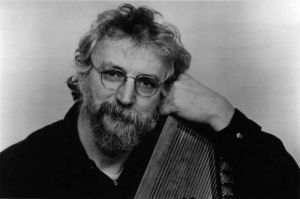Born August 18, 1940 in Yorktown, Virginia, Bryan Bowers was raised in New Bohemia near Petersburg of the Civil War's Battle Of The Crater fame. As a child, Bowers would tag along with the field workers and gandy dancers and learned to sing old call-and-answer songs. Bowers recalls, "The music I heard while working in the fields was mesmerizing. And, I'd see the gandy dancers coming down the tracks, setting the rails and getting their ties straight. You've heard that song `Whup Boys, Can't you line 'em?, Chack a lack.' Whup Boys, can't you line 'em? was the call the leader would sing. Chack a lack was the bounce-back of the hammer after falling on the pin. I just thought that music was something that everyone did. It was years later that I realized what I'd been raised around."
Bowers enrolled at Randolph Macon College in Ashland, Virginia, but found that college was not satisfying an emptiness he felt. Three hours short of earning a degree in Spanish, Bowers dropped out. About the same time (the late '60s), Bowers discovered music when he took up the guitar. "The roots of the music had gone real deep in me. Music was real fulfilling, unlike anything I had ever done before."
It wasn't long before Bowers encountered the autoharp. "I ran into a guy that played several instruments and could get the harp in good tune. He played without any fingerpicks, just with his fingernails. He had a real sprightly style on it. It was the first time I'd heard someone play it in good tune and play it well. It opened my eyes and my ears. I went out and got one the next day."
Bryan relocated to Seattle, WA in 1971 and played for coins as a street singer and in bars for the right to pass the hat. Once he had polished his technique, he headed east in a 1966 Chevy panel truck he affectionately called "Old Yeller." "The Dillards heard me in DC when I went to the Cellar Door," recalls Bowers. "I introduced myself and played the `Battle Hymn Of The Republic' to show them how the harp worked. Sam Bush, Curtis Burch and Courtney Johnson of the New Grass Revival were there. I didn't realize how presumptuous I was being. The Dillards took me to a bluegrass festival at Berryville, Virginia and when they got an encore, they put me out there for their second encore, saying `Here's a guy you ought to hear.' The bluegrass community has been real supportive."
Bower's creativity and talent have won him induction into Frets Magazine's First Gallery of the Greats after five years of winning the stringed instrument, open category of the magazine’s readers' poll. This distinction put Bowers along side other luminaries, such as Chet Atkins, David Grisman, Stephan Grappelli, Itzhak Perlman, Tony Rice, Rob Wasserman and Mark O'Connor, recognized for their personal accomplishments. In 1993, Bryan was inducted into the Autoharp Hall of Fame to stand only with Maybelle Carter, Kilby Snow, and Sara Carter.
From his rather unglamorous beginning as a street singer, Bryan Bowers has become a major artist on the traditional music circuit. He has redefined the autoharp and is also well known as a singer-songwriter. Bryan has a dynamic outgoing personality and an uncanny ability to enchant a crowd in practically any situation. His towering six foot four inch frame can be wild and zany on stage while playing a song like `Dixie' and five minutes later he can have the same audience singing `Will The Circle Be Unbroken' in quiet reverence and delight.
For nearly three decades, Bryan Bowers has been to the autoharp what Earl Scruggs was to the five-string banjo. He presents instrumental virtuosity combined with warmth, eloquence, expression and professionalism.
Album reviews:

